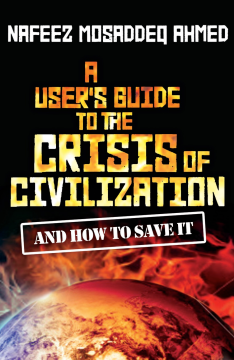
Additional Information
Book Details
Abstract
It often seems that different crises are competing to devastate civilisation. This book argues that financial meltdown, dwindling oil reserves, terrorism and food shortages need to be considered as part of the same ailing system.
Most accounts of our contemporary global crises focus on one area, such as climate change, or the threat of terrorism, to the exclusion of others. Nafeez Mosaddeq Ahmed argues that the unwillingness of experts to consider crises from an interdisciplinary perspective, has resulted in their failure to understand historical events. From ecology and the environment, to political governance, the global economy and international relations, Ahmed investigates contemporary crises, not as isolated events, but as trends and processes that belong to a single global system. Ahmed posits that we are therefore not dealing with a 'clash of civilisations', as Samuel P. Huntington argued. Rather, we are dealing with a fundamental crisis of civilisation itself.
'Few thinkers weave as many threads into a tapestry as Nafeez Ahmed has done so superbly in this book'
Dr. Jeremy Leggett, UK Department of Trade & Industry’s Renewables Advisory Board (2002-2006); CEO, Solarcentury, member of UK Industry Taskforce on Peak Oil & Energy Security; author, Half Gone and The Carbon War
'Important ... the first book to systematically explore their interconnections and place them within a single comprehensive narrative. That makes it a very worthwhile read for policy-makers everywhere'
Rt. Hon. Michael Meacher MP, UK Minister of State for the Environment (1997-2003); Under-Secretary of State for Health and Social Security (1975-79); Under-Secretary of State for Industry (1974-75)
'A staggeringly comprehensive bird's-eye view of the gaping cracks that are appearing in global industrial civilisation'
Richard Heinberg, Senior Fellow, Post Carbon Institute; author, The Party’s Over, Powerdown and Peak Everything
'The clearest synthesis to date of the systemic problems facing human civilisation'
Jeff Vail, Former US Department of the Interior Counterterrorism Analyst; former US Air Force Intelligence Officer for global energy infrastructure; author, A Theory of Power
'In this magisterial exposition of the multiple intersecting challenges facing humanity in our century Nafeez Mosaddeq Ahmed points to real solutions'
David Schwartzman, Professor of Biology, Howard University, Washington DC; author, Life, Temperature and the Earth: the self-organizing biosphere
'Confronts the reader with the stark message that life as we know it is unsustainable'
Kees van der Pijl, Professor of International Relations, School of Global Studies, University of Sussex; Chair of Department of International Relations and Director of Centre for Global Political Economy (2000-2006); Leverhulme Major Research Fellow; author, Modes of Foreign Relations and Political Economy (3 volumes)
'This important analysis exposes vital truths and challenges much conventional wisdom. It deserves to be widely read'
Mark Curtis, Honorary Research Fellow, University of Strathclyde; former Head of Policy, Action Aid and Christian Aid; former Research Fellow, Royal Institute of International Affairs; author, Web of Deceit: Britain’s Real Role in the World and Unpeople: Britain’s Secret Human Rights Abuses
'Forceful, with particularly good sections on agribusiness, US policies of 'energy security', and what the author terms the 'securitisation' of ordinary life by Western governments'
Guardian
Table of Contents
| Section Title | Page | Action | Price |
|---|---|---|---|
| Cover | Cover | ||
| Contents | v | ||
| Preface and Acknowledgements | vii | ||
| Introduction | 1 | ||
| BETWEEN DANGER AND HOPE | 1 | ||
| THE INVISIBLE CRISIS | 2 | ||
| THE FAILURE OF CIVIL SOCIETY | 3 | ||
| THE STRUGGLE FOR CIVILIZATION | 4 | ||
| THE CORE ARGUMENT | 6 | ||
| STRUCTURE OF ARGUMENT | 8 | ||
| 1. Climate Catastrophe | 16 | ||
| A DEBATE RESOLVED? CURRENT CLIMATE CHANGE IS UNEQUIVOCALLY ANTHROPOGENIC | 17 | ||
| NATIONAL SECURITY ALERT | 33 | ||
| RAPID CLIMATE CHANGE | 36 | ||
| ABRUPT CHANGE THROUGH ‘TIPPING POINTS’ | 40 | ||
| A SYSTEMIC FAILURE | 51 | ||
| 2. Energy Scarcity | 61 | ||
| ENERGY AND SOCIETY | 61 | ||
| QUICK ALTERNATIVES TO CONVENTIONAL OIL? | 79 | ||
| 3. Food Insecurity | 94 | ||
| THE GLOBAL FOOD EMPIRE | 94 | ||
| PEAK FOOD? | 98 | ||
| 4. Economic Instability | 107 | ||
| THE PROBLEM OF ‘GROWTH’ | 108 | ||
| GLOBAL FINANCIAL CRISIS | 121 | ||
| 5. International Terrorism | 138 | ||
| HYDROCARBON OVER-DEPENDENCE | 138 | ||
| AL-QAEDA AND POST-COLD WAR WESTERN COVERT OPERATIONS | 142 | ||
| THE ‘REDIRECTION’: AL-QAEDA SPONSORSHIP IN THE MIDDLE EAST AFTER 2003 | 152 | ||
| 6. The Militarization Tendency | 161 | ||
| EMPIRE | 163 | ||
| DEFENDING THE HOMELAND | 185 | ||
| 7. Diagnosis – Interrogating the Global Political Economy | 200 | ||
| THE CONTINUUM OF CRISIS, AND CIVILIZATIONS AS COMPLEX ADAPTIVE SYSTEMS | 200 | ||
| STRUCTURAL AND SOCIO-SYSTEMIC DYNAMICS OF CAPITALISM | 209 | ||
| NEOLIBERAL COMPUTATIONAL FINANCE CAPITALISM | 227 | ||
| THE POLITICAL-LEGAL REGULATION OF THE GLOBAL IMPERIAL SYSTEM | 236 | ||
| CAPITALISM’S PHILOSOPHICAL BASE | 239 | ||
| 8. Prognosis – The Post-Carbon Revolution and the Renewal of Civilization | 248 | ||
| Afterword | 258 | ||
| Notes and References | 259 | ||
| Index | 292 |
